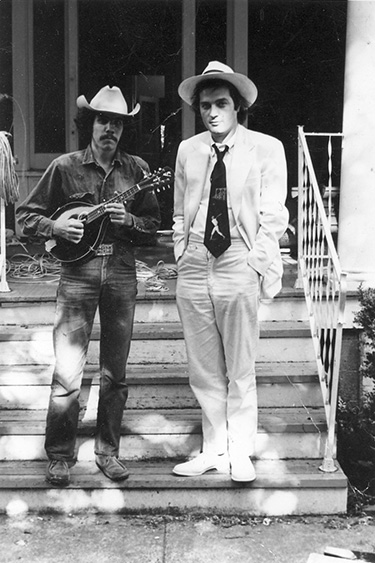Essay: It was a very odd year

Joe Garrett, right, with Chris Mattock, ’72, on the steps of the house they shared with about 15 psychiatric outpatients in the early 1970s.
In the early 1970s, while earning my master’s degree in political science from the UW, I lived in a halfway house for psychiatric outpatients. I was not a psychiatric outpatient myself, but it was the only place I could find that had rooms for rent.
Let me explain.
I arrived on campus at the last moment, and my first day I had to register for classes, meet the faculty, buy some books and find a place to live. I started off wandering down fraternity row, and at the very end of it, way down 17th Avenue Northeast, I saw a house unlike all the others. The paint was peeling, the weeds looked like they hadn’t been cut in 10 years, and the structure itself looked like it might blow over in a strong wind.
What it had going for it, however, was a sign in the front window: Room for rent, $60.
The landlady showed me the room, which was actually a living room with a little sleeping alcove. The price was right and it was a short walk to campus, so I signed a lease.
I think there were maybe 15 people living there, and I found most of them, well, a bit unusual. All very nice, all very friendly, but just a little different. Some of them walked very slowly or talked very slowly, but I didn’t think much about it.
There were also three people my own age, undergraduates, who seemed a little more like me. After a few days, I asked one of them what the deal was with some of the people living in the house.
“Don’t you know?” he asked.
“Don’t I know what?”
He went on to explain that the landlady ran it as a for-profit halfway house for psychiatric outpatients. It was to help them in the transition from psychiatric hospitals to the “real world.” And when the rooms weren’t all rented out, she’d rent them to UW students. The year went on about as normally as one could expect. The police visited the house more often than the typical boarding house, but it was usually nothing major. One of the boarders might have become confused and gotten lost somewhere. And occasionally the police would come because of gunfire.
We had one roommate who’d brought a big pistol back from Vietnam. And every so often he’d complain that the street lamp was bothering him, so he’d take careful aim and blast it.
We also lived next to a very prim and proper sorority. One of our residents decided to get naked and run circles around it for 20 minutes or so, and that, too, brought the police.
We who were students stayed there the entire academic year, but there was a high turnover rate among the others. Some returned to their hospitals; I also remember one who was wanted for robbing gas stations in Nebraska. The state police came and took him back.
Overall, the psychiatric outpatients, my roommates, were a wonderful group. When I was taking my oral exams, they knew it was something important. And when I came back to the house and said that, yes, I had passed, they all started cheering for me. Gary, the Vietnam vet, even pulled out his pistol and shot out a few streetlamps in my honor.